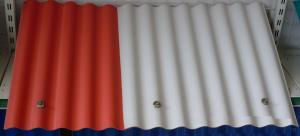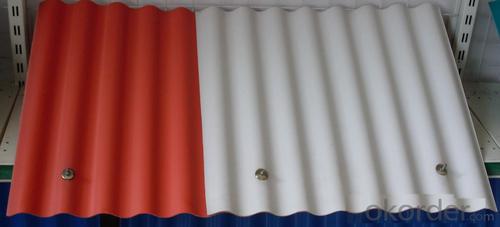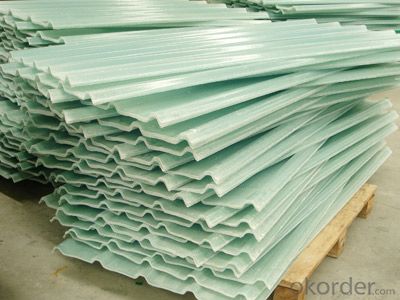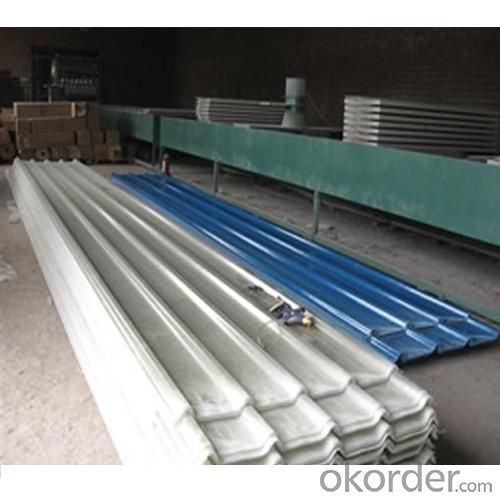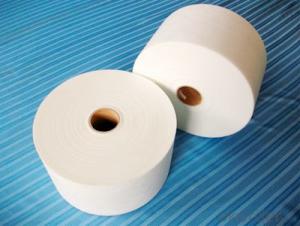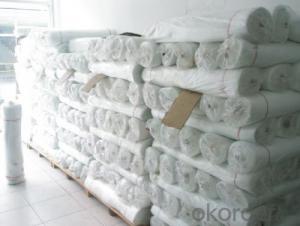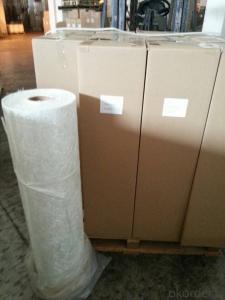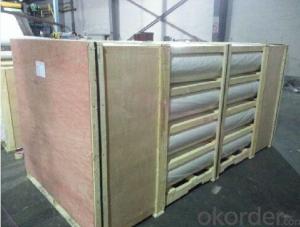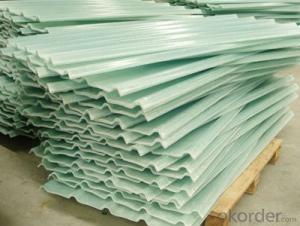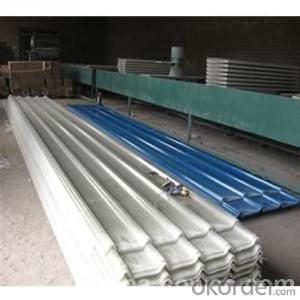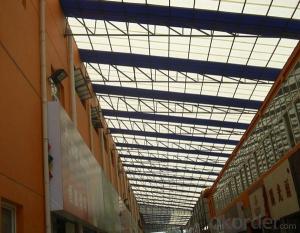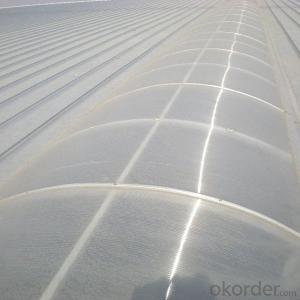Fiberglass Mat Tissue Reinforced Anti-Corrosion & High Strength Roofing Panels for Guard & House
- Loading Port:
- Shanghai
- Payment Terms:
- TT or LC
- Min Order Qty:
- 20000 kg
- Supply Capability:
- 200000 kg/month
OKorder Service Pledge
OKorder Financial Service
You Might Also Like
Anti-corrosion&High Strength Panels(Roofing Panels) Made Of Fiberglass Used in Guard&House
Description
In general, our company specializes in FRP grating, FRP decking, FRP platform and other products of FRP. We have a varity of FRP products sold over the country because we have our own teams of design, manufacturing and sales with hundreds of staffs.
At the same time, we are devoted to creating a production and marketing for FRP products, which has certain influence in China by proceeding with professional teams, rigorous quality management system and advanced production facility.
Today, we’re planning to win more market shares in the world and let more customers know us.
Photos
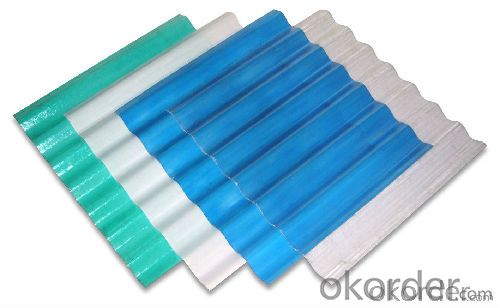
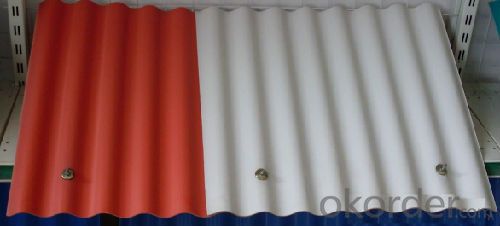
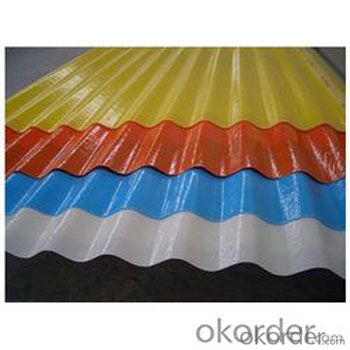
Product Traits
1. Corrosion resistance no rust, no maintenance, long service life.
2. Lightweight, high strength pultrusion process molding FRP profiles have high glass fiber content (60%). In this situation, the density of glass fiber reinforced plastic is only about a quarter of the steel.
3. The intensity and stiffness is quite prominent,.
4. Anti-fatigue high anti- fatigue strength, allowing repeated bending without permanent deformation.
5. Anti-aging select highquality FRP pultrusion profiles, the service life of the product can be more than 20 years.
6. Anti-UV agent are added into all pultrusion FRP profiles get the best anti-uv effect.
Product Advantage
Coated with prevent aging layer
Excellent insulating performance
Easy to maintain.
High strength.
Long service life.
Easy to install.
Good light transmittance.
Application
1)This kind of sandwich panel can be used in large industrial plants,warehouses, supermarkets, hospitals, stadiums, cold storage, activities room, buildings plus layer,
clean workshop and heat insulation fire place.
2) sandwich plate appearance, bright color, good overall effect, it sets the bearing, thermal insulation, fireproof, waterproof in one, and no two decoration, is a widely used, especially in the construction site of the temporary facilities such as office, warehouse, walls, but also embodies the modern construction site civilization construction,
3) in the fast installation and put into use, the assembly and disassembly, material turnover multiplexing index, have obvious advantages, greatly reducing the construction site temporary facilities, will be indispensable new lightweight construction materials
Specification
Unit Weight: 1800g/m² 2400g/m² 3050g/m²
Nominal Thickness:0.8mm,1.0mm, 1.2mm 1.5mm 2.0mm, 2.5mm
Heat Resistance Limit: -60 to +130
Light Transmittance: 75%±2% ( light green) 53%±2% (cream white)
Anti- ultraviolet Rate: 99.9%
Tensile Strength: 100Mpa
Flexural Strength: 180Mpa
Cracking Elongation Rate: 1.9%
Pasture Hardness: ≥50
Thermal Expansion Coefficient: 2.2×10¯125px/cm/
Thermal Conductivity: 0.18w/m° k
FAQ
1.Where do you export to?
A: Our products are very popular in Mid East, India, South East Asia, Latin America, Africa.
2.Q:Can you provide some samples?
A: Yes, of course. We will send you samples for your test berfore you place firm orders.
- Q: Can fiberglass mat tissue be used for lightweight construction?
- Yes, fiberglass mat tissue can be used for lightweight construction. It is a versatile material that offers high strength-to-weight ratio, making it suitable for various applications where weight reduction is desired without compromising structural integrity. Its lightweight nature enables easier handling, installation, and transportation, making it an ideal choice for lightweight construction projects.
- Q: Can fiberglass mat tissue be used for reinforcing fiberglass boats?
- Yes, fiberglass mat tissue can be used for reinforcing fiberglass boats. It is often used in boat construction and repair to strengthen the hull and improve its durability. The mat tissue is typically applied with resin to create a strong and rigid composite structure.
- Q: What is the typical width of fiberglass mat tissue rolls?
- The typical width of fiberglass mat tissue rolls is around 1 meter or 3 feet.
- Q: What is fiberglass mat tissue?
- Fiberglass mat tissue is a type of non-woven material made from glass fibers that are randomly oriented and bonded together with a binder. It is commonly used in various industries, including construction, automotive, and aerospace. The main purpose of fiberglass mat tissue is to provide strength, durability, and reinforcement to composite materials. It acts as a supporting layer between the resin and the glass fibers, helping to distribute stress and improve the overall mechanical properties of the final product. Fiberglass mat tissue has several advantages over other materials. It is lightweight, flexible, and easy to handle, making it ideal for applications that require complex shapes or curved surfaces. It also has excellent resistance to chemicals, moisture, and temperature changes, ensuring its longevity in harsh environments. In construction, fiberglass mat tissue is often used in the production of roofing materials, wall panels, and insulation boards. Its high strength-to-weight ratio makes it a popular choice for reinforcing concrete structures, such as bridges and buildings. In the automotive industry, fiberglass mat tissue is used in the manufacturing of car parts, such as body panels, bumpers, and interior components. It can enhance the structural integrity of these parts, making them more resistant to impacts and vibrations. In the aerospace industry, fiberglass mat tissue is employed in the production of aircraft components, such as wings, fuselages, and interiors. Its lightweight nature contributes to fuel efficiency and overall weight reduction, while still maintaining the necessary strength for safe flight. Overall, fiberglass mat tissue is a versatile and reliable material that plays a crucial role in enhancing the performance, durability, and safety of various products in different industries. Its unique properties make it an indispensable component in the production of composite materials.
- Q: How long does fiberglass mat tissue typically last?
- The duration of fiberglass mat tissue's lifespan is subject to fluctuation due to a variety of factors, including material quality, exposure to environmental conditions, and maintenance level. Typically, fiberglass mat tissue has a lifespan of 20 to 30 years. Nevertheless, by implementing appropriate installation techniques and consistent maintenance practices, it has the potential to endure beyond this time frame. It is crucial to emphasize that routine inspections and maintenance aid in the detection of any indications of deterioration or harm, permitting prompt repairs or replacements to guarantee its longevity.
- Q: Is fiberglass mat tissue suitable for railway infrastructure?
- Yes, fiberglass mat tissue is suitable for railway infrastructure. Fiberglass mat tissue is a strong and durable material that offers excellent resistance to corrosion, weathering, and chemical degradation. It is commonly used in the construction industry for reinforcing structures such as bridges, tunnels, and platforms. In the case of railway infrastructure, fiberglass mat tissue can provide several benefits. Firstly, it has high tensile strength, which means it can withstand the heavy loads and vibrations associated with train traffic. This helps to prevent cracking and structural damage, ensuring the longevity and safety of the railway system. Additionally, fiberglass mat tissue is non-conductive, which is a crucial characteristic for railway infrastructure. It helps to prevent the risk of electrical shocks and short circuits, which are common concerns in rail networks. This makes fiberglass mat tissue a reliable choice for railway infrastructure, especially in areas where electrical lines are present. Furthermore, fiberglass mat tissue is lightweight and easy to handle, making it convenient for installation in railway projects. It is also resistant to fire, making it a safe choice for railway infrastructure in terms of fire protection. Overall, fiberglass mat tissue is a suitable material for railway infrastructure due to its strength, durability, non-conductive nature, and fire resistance. Its use in railway construction can contribute to the reliability, longevity, and safety of the railway system.
- Q: Is fiberglass mat tissue suitable for insulation in HVAC ducts?
- Yes, fiberglass mat tissue is suitable for insulation in HVAC ducts. Fiberglass is a commonly used material for insulation due to its excellent thermal and acoustic properties. It is capable of withstanding high temperatures and is resistant to moisture, making it ideal for ductwork applications. Fiberglass mat tissue provides effective insulation by reducing heat transfer and preventing condensation buildup within the ducts. Additionally, it is lightweight, easy to install, and has a long lifespan, making it a cost-effective choice for HVAC insulation. Overall, fiberglass mat tissue is a suitable and reliable option for insulation in HVAC ducts.
- Q: Does fiberglass mat tissue provide any electrical insulation?
- Yes, fiberglass mat tissue provides electrical insulation. Fiberglass is a non-conductive material, meaning it does not conduct electricity. When used as a mat tissue, it acts as a barrier and prevents the flow of electrical current through the material. This makes it suitable for various electrical applications where insulation is required, such as in the manufacturing of circuit boards, electrical panels, and insulating tapes. Additionally, fiberglass mat tissue is known for its high dielectric strength, which further enhances its electrical insulation properties.
- Q: Can fiberglass mat tissue be used in corrosive environments?
- The resistance of fiberglass mat tissue to corrosion relies on its specific composition and quality. It can be used to some extent in corrosive environments. Fiberglass mat tissue is manufactured by combining fiberglass strands with a binder material. Although fiberglass itself is generally resistant to corrosion, the binder material used in the mat tissue can vary and impact its resistance to corrosive environments. Certain binders may offer better protection against corrosion, while others may be more prone to degradation. To enhance the corrosion resistance of fiberglass mat tissue in corrosive environments, it is possible to apply additional protective coatings or treatments. These coatings create a barrier against corrosive elements and prolong the material's lifespan. To determine the suitability of fiberglass mat tissue for a specific application, it is crucial to consider the particular corrosive environment and seek advice from experts or manufacturers. They can provide guidance on the ideal composition, treatment, and necessary precautions to ensure optimal performance and durability in corrosive environments.
- Q: Is fiberglass mat tissue suitable for insulation in pharmaceutical plants?
- Fiberglass mat tissue is not typically suitable for insulation in pharmaceutical plants. Pharmaceutical plants require insulation materials that meet specific requirements, such as being non-porous, non-shedding, and resistant to moisture and chemicals. Fiberglass mat tissue is a porous material and may shed fibers, which can contaminate the pharmaceutical production environment. Additionally, it may not provide adequate resistance to moisture and chemicals, which are common in pharmaceutical plants. It is recommended to use insulation materials that are specifically designed and certified for pharmaceutical applications to ensure they meet the necessary standards and regulations for insulation in these sensitive environments.
Send your message to us
Fiberglass Mat Tissue Reinforced Anti-Corrosion & High Strength Roofing Panels for Guard & House
- Loading Port:
- Shanghai
- Payment Terms:
- TT or LC
- Min Order Qty:
- 20000 kg
- Supply Capability:
- 200000 kg/month
OKorder Service Pledge
OKorder Financial Service
Similar products
Hot products
Hot Searches
Related keywords
